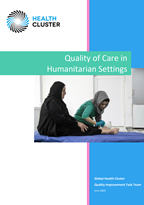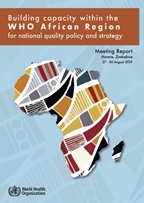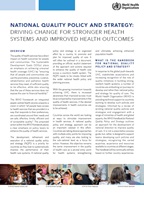/integrated-health-services-(ihs)/quality-of-care-(qoc)/generic-background.tmb-768v.jpg?sfvrsn=14567b25_1)
National quality policy and strategy
What we do
Technical foundation
The NQPS initiative works alongside WHO Regional Offices, Member States and partners to support countries in their efforts to develop national quality policy and strategy. The WHO Handbook for national quality policy and strategy outlines the approach to develop the national quality policy and strategy by addressing eight key elements.
Learning for national directions on quality
Implementation experiences from the sub-national, facility and community-level should feed into the development of national direction on quality of care. Lessons emerging from the front-line can help to ground-truth policies and strategies and build a sense of ownership among health workers, patients and communities.
Within the WHO Global Learning Laboratory for Quality, a learning pod on national quality policy and strategy aims to foster knowledge sharing between countries on national directions on quality of care and trigger in-country action.
Country technical support
Countries take their own approach to national quality policy and strategy development, informed by local context and usually taking place as part of the broader efforts on health system strengthening. With this guiding principle in mind, WHO provides technical support to countries on the development, implementation and refinement of national quality policies and strategies. A key principle is working with countries in a spirit of co-development to ensure country ownership. The approach to country support is continually refined based on emerging learning.
Numerous partners are working to support Member States in developing and implementing their national quality policies and strategies. WHO is working with partners through regular dialogue and shared learning to enhance the effectiveness of national efforts, focusing on leadership by countries.
The eight elements of developing a national quality policy and strategy
The eight essential elements outlined serve as the foundation for developing a national quality policy or strategy. They represent the common elements considered by countries as they set national direction on quality and were selected based on co-development with countries and global quality experts. The elements are not presented as a linear process and are intimately related; in practice some elements may be addressed simultaneously as the policies and strategies are developed and implemented, but each element merits specific consideration.
Related resources

Delivering quality health services: a global imperative for universal health coverage
This document – Delivering quality health services: a global imperative for universal health coverage – describes the essential role of quality...

Handbook for national quality policy and strategy: a practical approach for developing policy and strategy...
The “WHO handbook for national quality policy and strategy” outlines an approach for the development of national policies and strategies to...

This report summarizes the NQPS Learning Laboratory meeting that took place on 14-16 June 2017 at WHO headquarters in Geneva, Switzerland. Quality...

Quality of Care in Humanitarian Settings
Improving the quality of humanitarian health response has been a continuous goal for the humanitarian community. The development of global standards...

Building capacity within the WHO African Region for national quality policy and strategy
A four-day workshop was organized by the WHO Regional Office for Africa, in collaboration with the Integrated Health Services Department within the Universal...

The WHO Framework on integrated people-centred health services presents a vision in which “all people have access to health services that are provided...

